- Home
- Ana Sparks
Fiancée Faker - A Bad Boy Fake Fiancée Romance
Fiancée Faker - A Bad Boy Fake Fiancée Romance Read online
Table of Contents
Chapter One
Chapter Two
Chapter Three
Chapter Four
Chapter Five
Chapter Six
Chapter Seven
Chapter Eight
Chapter Nine
Chapter Ten
Chapter Eleven
Chapter Twelve
Chapter Thirteen
Chapter Fourteen
Chapter Fifteen
Epilogue
Fiancée Faker
Ana Sparks
Contents
Want More?
Chapter One
Chapter Two
Chapter Three
Chapter Four
Chapter Five
Chapter Six
Chapter Seven
Chapter Eight
Chapter Nine
Chapter Ten
Chapter Eleven
Chapter Twelve
Chapter Thirteen
Chapter Fourteen
Chapter Fifteen
Epilogue
Want More?
Copyright 2017 by Ana Sparks
All rights reserved. Except for use in any review, the reproduction or utilization of this work in whole or in part by any means, now known or hereafter invented, including xerography, photocopying and recording, or in any information storage or retrieval system, is forbidden without the explicit written permission of the author. All characters depicted in this fictional work are consenting adults, of at least eighteen years of age. Any resemblance to persons living or deceased, particular businesses, events, or exact locations are entirely coincidental.
How would you like to read a FREE full-length steamy romance? Subscribe to my new releases newsletter and get Bare: The Bad Boy's Baby, absolutely free!
LIKE Ana on Facebook for news, giveaways and more!
Chapter One
Ruby
“Where’s Ruby?”
I heard the demanding words coming from outside the dressing room. I was hiding, trying to stop sweating after the events of the previous few hours, and practicing my American accent into the round mirror—playacting some of the greats, the actresses from the 50s that I had imitated when I was younger.
“I just saw her a few minutes ago.” This was one of the other production assistants—a guy I sincerely detested, named Jeremy. “She was carrying some of the props. Looked like she didn’t know where she was going.”
“Does that girl ever know where she’s going?” That was my boss, Martin, who lorded over the production assistants, bossed us around, tossed us left, right and center, and had made me drive all the way across Los Angeles and back that morning.
Frankly, I was exhausted. Tired of being toyed with. Tired of being a production assistant, in a city that knew, just by looking at me, that all I wanted to do was become an actress.
“Well, if I can’t find her in the next five minutes, just let her know she’s fired, okay?” Martin scoffed.
With a lurch, I stepped back from the mirror and adjusted my black dress. I heard Martin leave the hallway, then I bolted out, finding Jeremy there, undoing a large pile of Christmas lights for the cheesy, Christmas themed rom-com we were working on. I couldn’t resist rolling my eyes.
“Oh, there you are, Ruby,” Jeremy said in mock surprise. “Martin was just looking for you. Think you should find him as soon as possible, don’t you?”
I glared at him: at his stupid, smug smile, at his blonde highlights. Despite being in his late twenties, he looked like a high-schooler, and had gotten several roles already: football player number four, the love interest in episode five of a teen drama, and the list went on. He’d told me recently that he’d just taken the production assistant job so he could “meet some of the higher-ups,” which disgusted me. I needed this job. Without it, I would be destitute, living on the streets of Silver Lake and wondering if I’d ever see England again.
Being broke wasn’t as exciting as I’d always thought.
“Run along and go find him,” Jeremy sighed, turning his eyes back to his Christmas lights. “We all know you haven’t bought new clothes in years. Losing this job wouldn’t exactly help you.”
Glancing down at my dress—which did have a few small holes along the seams, I turned back down the hallway and all but chased after Martin.
Huffing as I approached him, he spun, gave me a bored look, and said, “There you are. Listen, I need some caffeine from Silver Lake Coffee. And I need it yesterday.”
I balked slightly. I’d already been to Silver Lake, Echo Park, and back to downtown that morning, and I didn’t want to make the drive. But Martin only drank the coffee brewed exclusively at Silver Lake Coffee. And his eyes—almost black with anger—told me that if I didn’t get into my car, and go grab him an Americano, I would be on the streets in mere weeks.
“All right,” I said, giving him a nervous smile. “I’ll be back in about 45 minutes.”
“Make it 40,” Martin snapped, turning his back to me.
With a sudden rush of adrenaline, I ran toward the exit, through security, and back toward my little red pickup-truck: scuffed and dark with dirt. It had been one of my first purchases when I’d moved to Los Angeles four years ago. Back then, I was a bright-eyed English girl with aspirations and dreams about where my life would go.
I was positive that I would be a famous actress by the time I was 22. I would have my own sitcom, or at the very least, I would play “best friend” roles in silly rom com movies. The fact that I was 24 and still working as a production assistant to pay the bills didn’t help me sleep any better at night, but I suppose life didn’t always turn out as you planned. Most of the time you find yourself upside-down, flailing, just trying to make ends meet.
The traffic was bad. It was always bad. I cursed to myself, skidding to a halt in downtown, still miles away from Silver Lake Coffee. My phone began to buzz in my pocket—a welcome distraction—and when I picked up, my mother’s almost too-British accent blared into my ear.
“Darling, it’s your Mum,” she cried.
“Hi, Mum.”
“You’re sounding more and more like an American all the time! You’re losing your accent!”
“Mum, I’m literally around Americans all day. What did you think would happen?” I asked, suddenly exasperated. Why had I answered the phone? After a brief sigh, I continued. “How’s old Coventry these days?”
She fell into it immediately, complaining about my hometown and about how the ladies at her church behaved in most un-churchlike ways. I stopped and started through downtown, easing toward Silver Lake, and counting the seconds until the end of the day.
“…And you won’t believe what she said about my baked goods,” Mum continued, her voice now high-pitched. “Sweetheart, when are you going to come home for a visit? It’s been years.”
This question always came up. I didn’t want to reveal what a failure I was, and so I always lied.
“Well, I have so many auditions coming up, I don’t think I can bear to miss weeks in the city. Maybe at Christmas?”
Maybe by then, I’d have my first gig. Maybe by then, I’d be “somebody” and I could walk through Coventry with my head held high, hearing the whispers of my classmates behind me.
“That’s her. She went to L.A. and her career just took off—like that!”
Ha.
I was almost at the café, finally, and I rushed my mother off the phone, knowing that she could rattle on for days if I didn’t stop her.
“I’ll call you later, Mum, all right?”
It was nearly ten at night—an eight hour time difference
—and I needed her to get some rest. When she didn’t take care of herself, she grew more anxious, more apt to call me in the middle of the night and recite to me everything her doctor had recently told her about low-sodium diets.
“Just remember what I said, darling. You’d be welcome for a visit any time. All right?”
I muttered something affirmative and ended the call, diving out of the car and running into the café.
Silver Lake Coffee featured three baristas who all seemed to shop at the same second-hand shop, wearing vintage shirts and sweaters and tight jeans, with one opting for a proper three-piece suit vest, the stuff of old black-and-white movies. The one at the register had a sculpted mustache, which curled up on either side.
“Can I help you?”
“Yes. Hi, I need an Americano. Large.” I could feel sweat dripping down my neck.
“Any milk with that?”
“No.” That had been a mistake once, bringing the coffee back with milk. Martin had been outraged, informing me that those who drank their coffee with milk were “weak-minded.”
I watched as the barista worked away at the espresso machine, whistling along with the indie radio station, before sending the paper cup back toward me. I paid the ridiculous five dollars (the same thing would have been no more than a two quid back home), and then fled the café. It was two-thirty, and I’d been gone for about a half-hour.
Time was ticking.
Ducking back into my car, I cranked it back toward downtown. The coffee remained safe in my cup holder, tilting slightly back and forth with each turn. I sang along to the radio and rolled down my window when I realized I was still sweaty.
“Yes, sir,” I began, practicing my American accent once more. I had an audition the following day for a period piece—a young housewife who awaits her husband’s return from the war while living with a sick child in North Carolina in the 1940s. “I waited up for you, day-in and day-out, hoping and praying that you’d appear on this very doorstep. I knew, no matter our distance, that you’d return to me.”
The script was shit, but despite everything, I would have killed for the role.
Twenty minutes later, my car zoomed into the parking lot and I rushed toward the entrance, greeting the security guards with a brief smile. Martin was still on set, helping a few of the other production assistants with prop set-up.
When I walked up, he was scolding my friend Jeanie, saying, “In what world would you choose this kind of lamp for this set, Jeanie? It won’t look good on camera. I mean, can you imagine, flicking on the television and finding yourself looking at this lamp? You’d think it was hideous, but more than that, you wouldn’t be able to focus on anything else.”
I glanced at the lamp—a 1950s-era thing with floral edging. It was a perfectly fine lamp. Sometimes, when Martin got it in his head that he hated something, he vomited his hatred onto anyone nearby and there was no escape.
Jeanie glanced towards me, her green eyes wide and frightened. Martin followed her gaze, marched toward me, and swiped the coffee out of my hand. He took a drink immediately and then spluttered. I felt like I’d been slapped.
“What is it?” I asked, my voice soft.
“Cold, you idiot,” he coughed, swiping his hand across his mouth. “Freezing cold. How could you bring me something like this?”
“It was a long drive back—” I began, feeling suddenly defensive. “Silver Lake is miles away…”
But he refused to listen to reason. He began to mock me, thrusting the coffee back into my hands. “I get it; our little British girl thinks it’s too tough to drive across L.A. Little British girl couldn’t make it in big, bad Los Angeles. Little British girl needs to run home across the pond back to her fancy British world.”
My nostrils flared. As my lips parted, preparing to toss him a number of insults in return, Jeanie shook her head, almost imperceptibly at me. “Don’t,” she mouthed the word.
But Martin wasn’t done. He scoffed at me, and then pointed toward the door. “You’ve made a mockery of yourself today, Ruby. I think you should go home for the day, since you can’t even seem to accomplish a single, simple task. Coffee should be the simplest of all. And don’t even get me started on lamps.”
My eyes shimmered with sudden tears. I turned away from him, running towards the staff room and finding my things. I still held the cold coffee in my hands, deciding that letting five-dollar coffee go to waste was one of the worst things I could do. Sipping it grandly, I turned towards the exit, trying to hold back my tears.
Jeremy waved his fake-tanned hands in my face, spewing, “All right, Ruby, have a swell day! Too bad your job here is meaningless, huh?”
Fuck him. And fuck this job, I thought, ducking through the door and out into the bright California sun.
I knew I was better than this. A better actress. A better type of woman. But I couldn’t seem to find the strength to climb the Hollywood ladder. I felt as though I was doomed to do nothing more than retrieve coffee forever.
Chapter Two
Billy
The downtown motel was a mistake. It was run-down, shabby, and tucked between several high-rise buildings, but it was all I could get at a moment’s notice. I hadn’t been back in Los Angeles in years, not since right after my first tour in Afghanistan. Afterwards, I’d run off to New York City—Brooklyn, to be specific—and found refuge in a new place, far away from my father. Three hours ahead and thousands of miles from home, I felt some kind of peace.
At least, as much peace as I could stand.
I showered in the sputtering motel bathroom, scrubbing at my black hair, my tattooed biceps and back. Standing at six foot two, the showerhead fired squarely into the middle of my chest. I cursed at it.
I should have stayed home. I shouldn’t be here.
But my sister, Leandra, had called me up two days before, telling me—with that somber voice she only used for “special” occasions—that she needed me for a family emergency. “We need to discuss something, and we absolutely can’t do it over the phone,” she’d said. She was the eldest, so her word was law. I was almost 30, but she still commanded a fraternal obedience in me.
I had to do what I could to protect us. The Johnston family. Especially since I lived with the guilt of abandoning them every single fucking day.
Besides, it wasn’t as though I wasn’t living my own life out east. Dressing quickly in a wife-beater and a pair of torn jeans, I took three long steps towards the motel door and threw it open. I ducked into the incredible August heat, already feeling the sweat beading at my hairline. I’d forgotten that no shower in L.A. in August could combat the heat. You just showered and sweated into eternity. There was no escape.
Out east, I had been working on the near-right side of the law, doing private security for some of Brooklyn’s more unsavory characters. There was Bobby Buckwheat, who operated a weed business, and had a bunch of college-aged kids working for him. Then, there was Trinity Callahan, who had a hair studio, much like my sister. But she laundered money through it, while her husband sold even harder drugs on the side. I had these people’s backs. And I worked carefully, diligently, to ensure their safety.
It wasn’t much of a life. But while I’d been in Afghanistan, I’d realized that “not much of a life” was really what we all had. It could all be over in a split second. Bullets. Bombs. Sickness. A rogue car, running you over in the middle of the street. As long as I had enough money to keep going, to live, then I was fine.
Leandra’s hair studio was just a few blocks away, walking distance from the motel. Walking through L.A. wasn’t necessarily something I’d done often, and it made me feel bizarre, like a stranger in my own town. I tried to take in everything as I walked: the way the steaming sun glinted against the windows, the way the drivers in cars stared at me.
I couldn’t imagine what my sister had in store for me. A family emergency. Mom was already gone, buried. Dad seemed fine—at least, he had been in good health, the last time I checked. But y
ou could never count on anything to last, really. Good health could turn on a dime.
As I rushed forward, something—no, someone—crashed against my shoulder. A young woman had whisked around the corner, jangling her keys and clutching a cup of coffee. Her blue eyes burned with anger and I realized that as she had run into me, the lid on her coffee had flown off and the liquid had splashed all over her dress and her neck, even getting into her blonde hair.
“Whoa, whoa!” I cried out, stretching my palms skyward. “Watch where you’re going!”
She glared at me, coffee dribbling off her chin. I noticed, then, that her dress was speckled with holes, showing its age. Otherwise, she was incredibly beautiful, with bright blue eyes that seemed to reflect the sky.
“Watch where I’m going? It was a corner! And I was trying to avoid assholes like you who are too busy staring into space to know that they have to share the sidewalk!”
Taken off-guard, I looked into her eyes. I hadn’t expected such a ferocious response, and I really hadn’t expected the British accent. It was adorable, even if it was carrying an insult. I flashed her my best smile, trying to calm her anger. “You’re right, I was looking…”
“Whatever,” she cut me off with a scowl. “Did you know this coffee was five dollars?”
“Sounds like you got screwed over by the L.A. hipsters,” I replied, grinning even wider.
There was something between us. I could sense it. Her eyes flickered with amusement, even as she berated me.
“What’s it to you if I got screwed over?” she said, falling into an exhausted laugh. “It’s impossible not to get screwed over in this city.”
“You’re telling me,” I said. “That’s why I don’t live here anymore. Got the hell out of here when I could. And I think you should do the same. Back to Europe, or wherever it is you come from.”

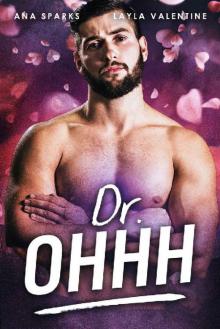 Dr. Ohhh
Dr. Ohhh Indebted To The Sheikh (You Can't Turn Down a Sheikh Book 5)
Indebted To The Sheikh (You Can't Turn Down a Sheikh Book 5)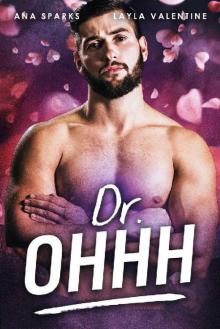 Dr. Ohhh - A Steamy Doctor Romance
Dr. Ohhh - A Steamy Doctor Romance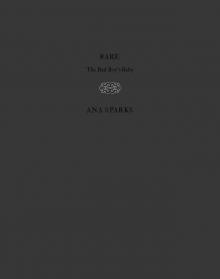 BARE: The Bad Boy’s Baby
BARE: The Bad Boy’s Baby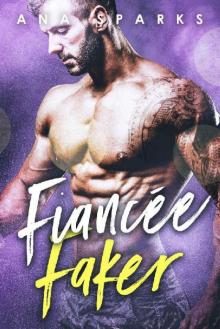 Fiancée Faker - A Bad Boy Fake Fiancée Romance
Fiancée Faker - A Bad Boy Fake Fiancée Romance V-Card For Sale – A Billionaire/Virgin Second Chance Auction Romance
V-Card For Sale – A Billionaire/Virgin Second Chance Auction Romance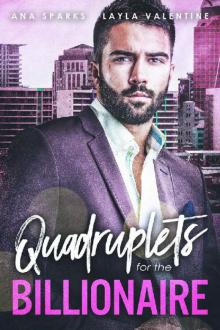 Quadruplets for the Billionaire (Babies for the Billionaire Book 2)
Quadruplets for the Billionaire (Babies for the Billionaire Book 2)